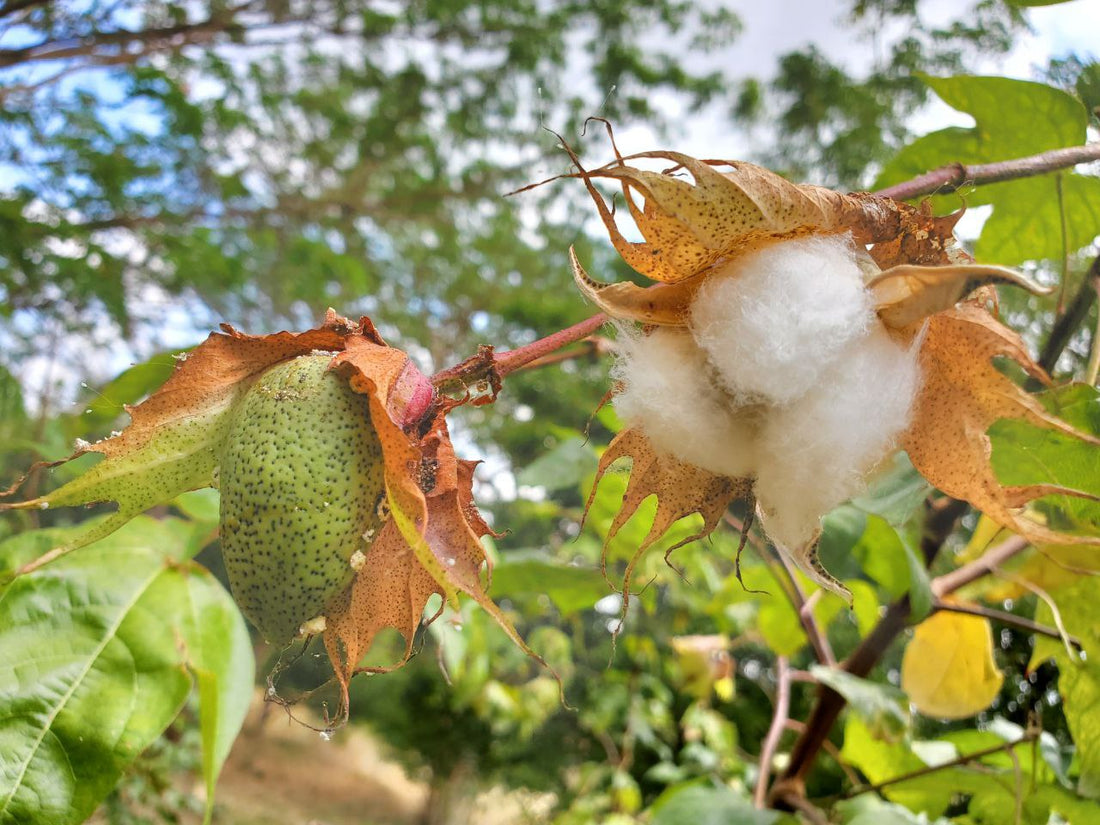by Paolo Palanca
Near the southwestern tip of Luzon, the Mahalina Foundation is growing, learning, and teaching to support our local farming and textile industries.
The day began with a smooth and easy drive south of Metro Manila. While Calatagan is more known for its beaches and watersports, a unique farm is nestled among the mango orchards and rice fields that also populate the area. We arrived at the rolling hills which Mahalina Foundation calls home and were introduced to their beautiful and lush scenery. HABI member Dr. Patricia Araneta, president of Mahalina Foundation, oversees the farm with her team.
HABI Chairman Emeritus Maribel Ongpin and Mahalina President Patricia Araneta overlooking a portion of the cotton farm.
Mahalina’s different plant dyes, design patterns, and techniques being shown to the HABI team.
We kicked off the visit with a very informative and educational illustration on the organic dyeing process. The Mahalina Foundation team had a very engaging talk complete with fresh examples of the different plants both in raw form and already synthesized or distilled into the different dyes. It was a treat to be able listen and learn from their first-hand experience. Being able to see the different dyes in person while listening to their descriptions and the process was a very valuable first-hand experience.
Natural Plant Dyes from different sources such as turmeric, mango leaves, annatto, or saffron create various hues and shades all processed at the farm. Each plant can create up to four different shades. These are then used to dye the fabrics into different patterns.
They meticulously catalogued all the relevant details of the process and the different hues on different fabrics. They have illustrations of the plant itself used for the dye. The different hues made with copper, aluminum, or iron on linen or cotton bagasse, as well as different lengths of time of 10 seconds, 1 minute, 20 minutes, and 30 minutes. The team truly does vital work.
There were different plots of medicinal, and aromatic plants. We learned about the benefits of mixed-crop growth vs monocropping. When certain plants are grown next to each other, they share nutrients through their root network in the soil, helping each other grow together stronger. This is as opposed to just planting the same plants in an area, which uses up the nutrients of the soil without replenishing it.
We were very fortunate to find an unopen cotton pod next to an opened pod with exposed soft cotton right next to it! Was very interesting to see it in two different stages of its growth cycle.
Mia Villanueva, president of HABI: The Philippine Textile Council, with a Cotton Plant
Patricia Araneta & Maribel Ongpin
HABI and Mahalina Foundation teams exploring the Cotton field
After exploring the grounds, we shared a sumptuous lunch of different delicious organic dishes; vegetable okoy, monggo and ginger soup, steamed fish in banana leaves, with fresh mangos, watermelon, and papaya for dessert.
As the day ended, Mahalina foundation had one last surprise for the HABI Team, Mrs. Lim and Mrs. Ongpin were given gifts of cotton plant saplings and we all could choose to take home seeds from Mahalina’s wide selection such as Sili, Spinach, Okra, Patola, and Patani. A great end to a day well spent, with new cotton buddies!
Learn more about the Mahalina Foundation at: https://www.instagram.com/mahalinafoundation/
Follow HABI The Philippine Textile Council at: https://www.instagram.com/habicouncil/




